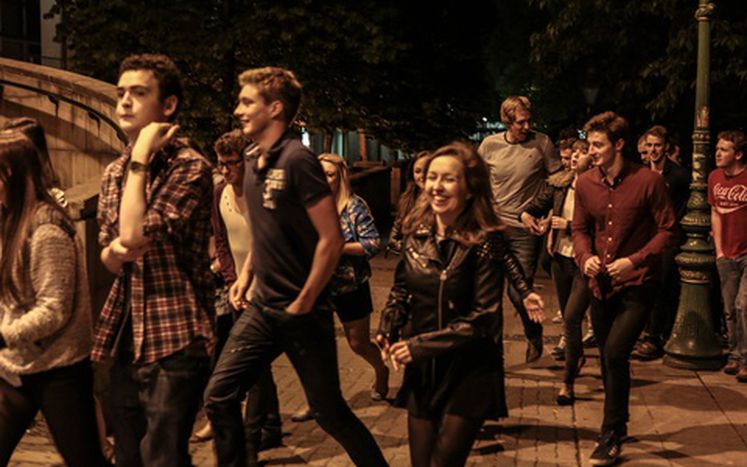
Sexual Harassment in Edinburgh: the Wolf on Campus
Published on
Translation by:
georgie scottAt the end of 2013, the University of Edinburgh declared itself 'officially feminist', but what resources are available for those fighting sexual harrassment among students? From lad-culture to Robin Thicke and a serious lack of understanding, Lucille Fonteny investigates the situation on campus where the fight against sexual harrassment is far from over...
At the end of 2013, EUSA, the Edinburgh University Student Association, voted unanimously in favour of the motion for a 'feminist society'. It comes as no surprise given that a survey carried out by the same association one month later showed that one in three female students interviewed had been the victim of sexual harrassment. According to the survey, 61% of 781 students spoken to admitted changing their behaviour in the city due to feelings of insecurity. Chilling statistics, but in what way does this affect Edinburgh University students in particular? Though the figures reveal a genuine issue, it can be difficult for those defending women's rights to clearly identify the causes and mobilise students.
 "I think I'm really lucky not to have been sexually harrassed and it would be naive to say there wasn't a problem," admits Catherine, 21, a linguistics student. Sitting on a sofa in the university's main hall, she nonetheless recalls her experience as a waitress in one of the capital's student bars not far from the campus, The Hive. She was treated as anything but a queen bee: "People made rude comments from the other side of the bar. Groups of guys talked about your body and made sexual comments directed at you in the third person." The same club received a number of harrassment compaints from its clients, one in particular on its Facebook page, which has since been removed.
"I think I'm really lucky not to have been sexually harrassed and it would be naive to say there wasn't a problem," admits Catherine, 21, a linguistics student. Sitting on a sofa in the university's main hall, she nonetheless recalls her experience as a waitress in one of the capital's student bars not far from the campus, The Hive. She was treated as anything but a queen bee: "People made rude comments from the other side of the bar. Groups of guys talked about your body and made sexual comments directed at you in the third person." The same club received a number of harrassment compaints from its clients, one in particular on its Facebook page, which has since been removed.
the lad truth
For feminists fighting against sexual harrassment, this sort of behaviour can be summed up in two words: lad culture. A hyper-masculine phenomenon characterised by sexism, homophobia and large amounts of alcohol, lad culture is widespread among young students, above all in sporting environments and in particular among football and rugby teams. The term 'lad' is a fitting caricature of a young male that thinks being cool means treating the opposite sex as an object. It's a stereotype that is easily identified among students. Natalia is 22 and studies philosophy and politics. She explains that this culture is about a desire for "power", stemming from the "pressure to appear virile" which "allows men to avoid feeling responsible for their actions and legitimises abuse."
 "It's a term to describe a behaviour" for Stacey Devine, NUS Scotland. She describes herself as a "massive feminist" and hates the trivialisation of "lad-think" demonstrated by Facebook groups, such as Uni Lad, which are filled with explicitly sexist photos and jokes: "these comments are seen as inoffensive pleasantries. But the way they are casually accepted simply shows just how far this culture has been normalised. And it does influence men." Sarah Moffat is a member of the feminist branch of EUSA. She admits that 'lad' culture is difficult to define, but says it is a behaviour type that is becoming increasingly popular. "We feminists use the term 'patriarchy' to talk about sexism, but in the student framework the term 'lad' is much better suited and immediately understood on campus," she explains, adding "Figures show that sexual harrassment is particularly widespread among students, and that's due to a culture which incites people to be sexually aggressive."
"It's a term to describe a behaviour" for Stacey Devine, NUS Scotland. She describes herself as a "massive feminist" and hates the trivialisation of "lad-think" demonstrated by Facebook groups, such as Uni Lad, which are filled with explicitly sexist photos and jokes: "these comments are seen as inoffensive pleasantries. But the way they are casually accepted simply shows just how far this culture has been normalised. And it does influence men." Sarah Moffat is a member of the feminist branch of EUSA. She admits that 'lad' culture is difficult to define, but says it is a behaviour type that is becoming increasingly popular. "We feminists use the term 'patriarchy' to talk about sexism, but in the student framework the term 'lad' is much better suited and immediately understood on campus," she explains, adding "Figures show that sexual harrassment is particularly widespread among students, and that's due to a culture which incites people to be sexually aggressive."
On the ground, on nights out, the facts speak for themselves. One Friday evening at the end of exam time, a large event is organised on campus for about a thousand people. David, an organiser supervising the night, tells us there are three sexual harrassment complaints every Friday night. He implies that much of the blame lies with the groups of imposing "football lads" who come to these parties and think that "anything goes".
Serious feminists, but are they taken seriously?
EUSA was the first feminist association to ban Robin Thicke's song Blurred Lines from Edinburgh University. The song was a massive hit in 2013 with lyrics that Stacey Devine describes as a "hymn for rape". It talks about women being "domesticated animals", about giving them something big enough to "split their ass in two" and most importantly, it talks about how the writers and singers "know she wants it". It was a logical decision for Britain's top feminist student association to ban the song, but the action was little understood among students, whose opinions on the topic vary greatly.
 "No one paid any attention to it on campus," says Amy, a 20-year-old medicine student, "There are so many other songs that are awful about women." Her friend, Oscar, agrees with her: "All the songs playing on student nights are the same; it's a lot of fuss about nothing". Ines, a 19-year-old Economics student thinks that "students aren't stupid, they can see the problem with the song." Natalia notes: "Although the ban could have followed a university-wide consultation, it has allowed students to think about the gravity of lyrics that propogate the idea that 'no' doesn't really mean 'no'. Saying that students can think for themselves is too passive; the sort of attitude that this song represents needs to be dealt with properly." But even for someone like herself, who shares the same feminist ideals as EUSA, there is a problem with the way they carry out their actions. "They use an overly aggressive tone and aren't educational enough. It only reinforces the image of stereotypical bitter feminists." She decided to stop attending their events for that reason, "I didn't think it was helping anymore," she admits. Amy also admits she found it difficult to get on with the feminists: "I'm sure they would tell me off for not being committed enough."
"No one paid any attention to it on campus," says Amy, a 20-year-old medicine student, "There are so many other songs that are awful about women." Her friend, Oscar, agrees with her: "All the songs playing on student nights are the same; it's a lot of fuss about nothing". Ines, a 19-year-old Economics student thinks that "students aren't stupid, they can see the problem with the song." Natalia notes: "Although the ban could have followed a university-wide consultation, it has allowed students to think about the gravity of lyrics that propogate the idea that 'no' doesn't really mean 'no'. Saying that students can think for themselves is too passive; the sort of attitude that this song represents needs to be dealt with properly." But even for someone like herself, who shares the same feminist ideals as EUSA, there is a problem with the way they carry out their actions. "They use an overly aggressive tone and aren't educational enough. It only reinforces the image of stereotypical bitter feminists." She decided to stop attending their events for that reason, "I didn't think it was helping anymore," she admits. Amy also admits she found it difficult to get on with the feminists: "I'm sure they would tell me off for not being committed enough."
educating society
Nethertheless the student association feminists believe that it is only through concrete actions that sexual harrassment can be reduced. Stacey Devine, who believes education to be at the heart of all change, offers training alongside the NUS, at the very heart of universities, to change mentalities, encourage students to intervene when they witness harrassment, and to promote male-female equality. The progamme is called "Get Savvy" and is aimed at both sexes. Last year, Stacey trained 150 people, a third of whom were men. Her aim: to make this training obligatory at the beginning of university. Currently, it is mostly used as a form of punishment for students that have behaved badly. Equally widely used are sanctions on their academic results and exclusion from student nights.
 Sarah Moffat is convinced that this "is the most effective" method, even if it is "difficult to measure progress when talking about sexual harrassment". "There has been an increase in complaints since the publication of the study, but we hope that's because women feel more inclined to speak up and not because incidents have increased," she explains. However, although the hyper-masculine lad culture is a perfect scapegoat, epitomising the problem of sexual harrassment, feminists in a lot of associations have no problem going after society at large. "You have to change attitudes in general and the patriarchal society in which we live," rallies Stacey. "The truth is that men are born with privileges which give them the right to tell women how to behave," she continues. Grand designs then, but little support from students themselves. Maybe it's because the punititive system reinforces the idea of bitter feminism, or perhaps it's because, as already mentioned, they lack an educational slant. What is sure however is that before changing society, the feminists need to change the way they are perceived by students at Edinburgh University.
Sarah Moffat is convinced that this "is the most effective" method, even if it is "difficult to measure progress when talking about sexual harrassment". "There has been an increase in complaints since the publication of the study, but we hope that's because women feel more inclined to speak up and not because incidents have increased," she explains. However, although the hyper-masculine lad culture is a perfect scapegoat, epitomising the problem of sexual harrassment, feminists in a lot of associations have no problem going after society at large. "You have to change attitudes in general and the patriarchal society in which we live," rallies Stacey. "The truth is that men are born with privileges which give them the right to tell women how to behave," she continues. Grand designs then, but little support from students themselves. Maybe it's because the punititive system reinforces the idea of bitter feminism, or perhaps it's because, as already mentioned, they lack an educational slant. What is sure however is that before changing society, the feminists need to change the way they are perceived by students at Edinburgh University.
this article is part of a special edition dedicated to edinburgh as part of cafebabel's EU in motion project with the support of the european parliament and the hippocrene foundation. find THE REST OF THE SERIES on the MAGAZINE's front page.

Translated from Harcèlement sexuel à Édimbourg : le loup sur le campus



